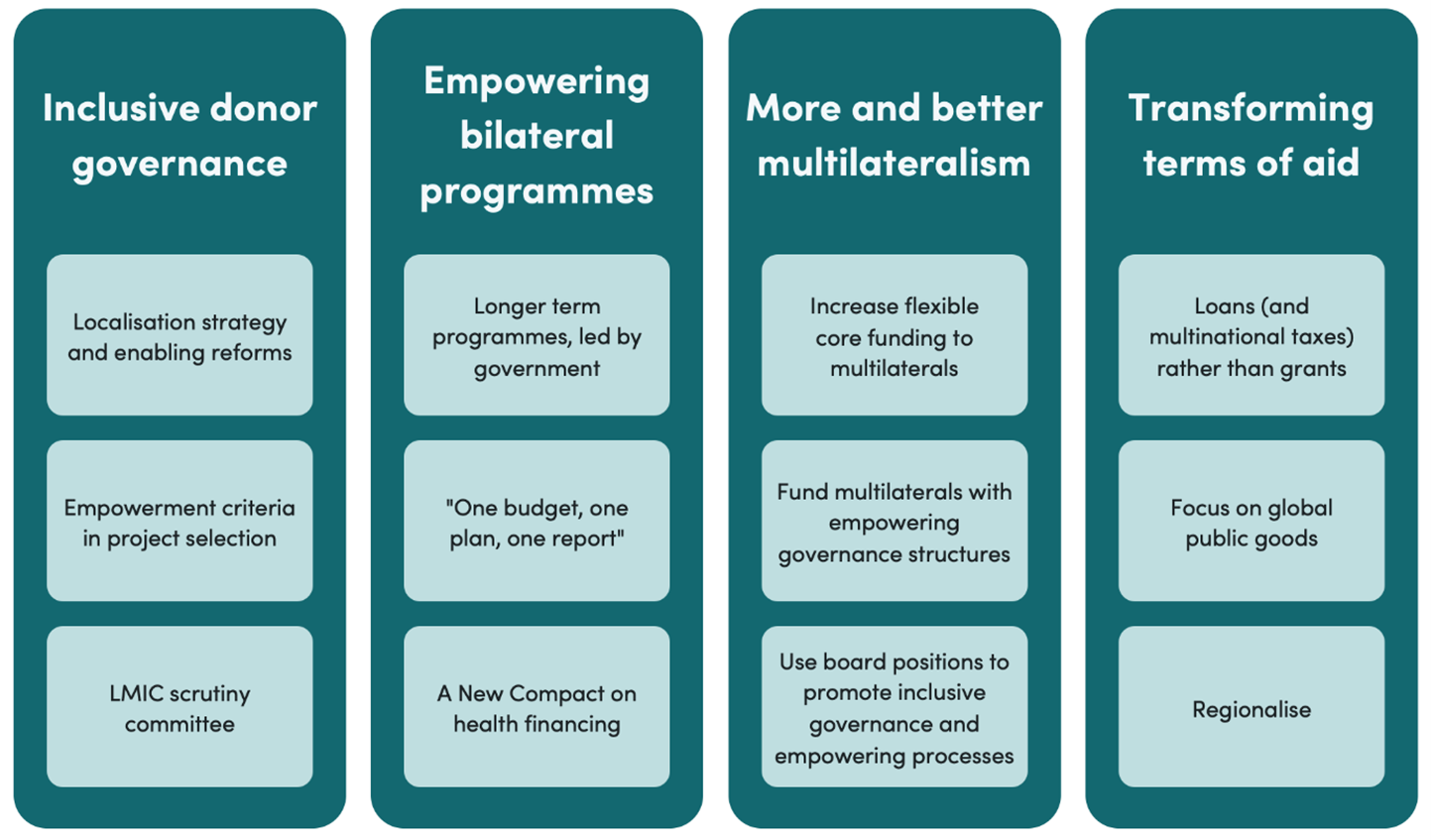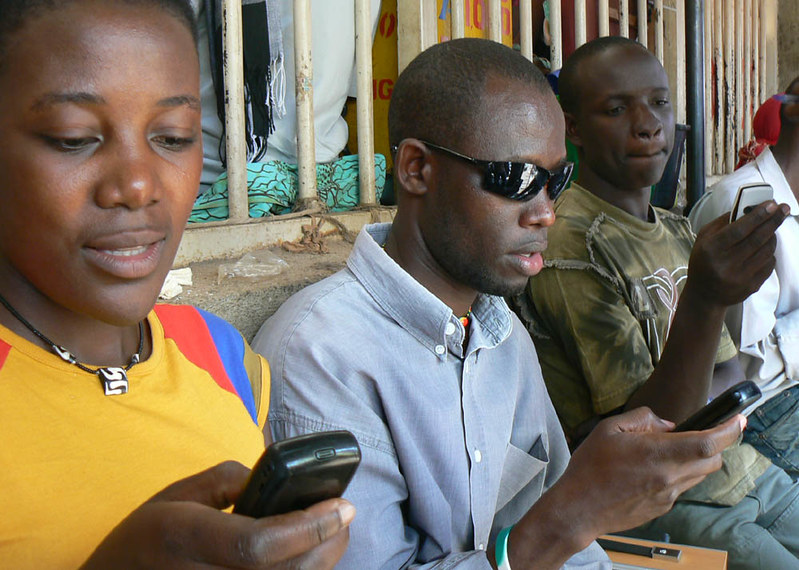*This is a joint post with Steve Radelet The extraordinary challenges and opportunities of today require a new vision of American global leadership based on the strength of our core values, ideas and ingenuity. They call for an integrated foreign policy that promotes our values, enhances our security, helps create economic and political opportunities for people around the world, and restores America's faltering image abroad. We cannot rely exclusively or even primarily on military might to meet these goals. Instead, we must make greater use of all the tools of statecraft through "smart power," including diplomacy, trade, investment, intelligence, and a strong and effective foreign assistance strategy.In today's world, foreign assistance is a vital tool for strengthening U.S. foreign policy and restoring American global leadership. Foreign policy experts on both sides of the political aisle now recognize the importance of strong foreign assistance programs. But they also recognize that our foreign assistance programs are out of date and badly in need of overhaul to meet the challenges of the 21st century.In 2004, as members of the CGD-sponsored Commission on Weak States and US National Security, we recognized the need for rebuilding the mission, mandate and organizational structure of our outdated foreign assistance apparatus to meet today's foreign policy challenges, particularly our institutions and policies focusing on global development. We called for it then, welcome the more recent calls, and say again: It's time for the United States to establish a new Cabinet-level Department of Global Development. We hope that our next President will believe, as we do, that investing in global development is an investment in America's future -- strengthening its security, its economic opportunities, and its moral values. And that establishing a Department of Global Development to manage our foreign assistance -- both bilateral and multilateral -- and other development policy instruments would streamline the currently fragmented bureaucracy, reduce duplication, strengthen our ability to align major programs with our key objectives, and leverage U.S. dollars and influence to get results. It would establish development as the primary mission of US foreign assistance, elevating development to equal standing with diplomacy and defense as the three key pillars of U.S. foreign policy.Because development is about more than development assistance, the new Department would have a mandate for policy coherence on the full range of US policies affecting poor countries, such as trade, environment, migration, and debt. It would facilitate the professionalization of a core of development expertise within the U.S. government on issues of public health, climate change, agriculture, institutional development, education, infrastructure, clean water, and other development issues. It would allow for the independence necessary to ensure that short-term political goals do not crowd out long-term development objectives.Creating a new Department will be a heavy lift politically, and will take significant efforts on the part of both the new administration and Congress. But it would create a powerful new instrument for U.S. global leadership. We hope that momentum continues to build and that these ideas feature prominently in the 2008 presidential campaigns. It's time for the U.S. to take a smarter and stronger approach to building a better, safer world.
The extraordinary challenges and opportunities of today require a new vision of American global leadership based on the strength of our core values, ideas and ingenuity. They call for an integrated foreign policy that promotes our values, enhances our security, helps create economic and political opportunities for people around the world, and restores America's faltering image abroad. We cannot rely exclusively or even primarily on military might to meet these goals. Instead, we must make greater use of all the tools of statecraft through "smart power," including diplomacy, trade, investment, intelligence, and a strong and effective foreign assistance strategy.In today's world, foreign assistance is a vital tool for strengthening U.S. foreign policy and restoring American global leadership. Foreign policy experts on both sides of the political aisle now recognize the importance of strong foreign assistance programs. But they also recognize that our foreign assistance programs are out of date and badly in need of overhaul to meet the challenges of the 21st century.In 2004, as members of the CGD-sponsored Commission on Weak States and US National Security, we recognized the need for rebuilding the mission, mandate and organizational structure of our outdated foreign assistance apparatus to meet today's foreign policy challenges, particularly our institutions and policies focusing on global development. We called for it then, welcome the more recent calls, and say again: It's time for the United States to establish a new Cabinet-level Department of Global Development. We hope that our next President will believe, as we do, that investing in global development is an investment in America's future -- strengthening its security, its economic opportunities, and its moral values. And that establishing a Department of Global Development to manage our foreign assistance -- both bilateral and multilateral -- and other development policy instruments would streamline the currently fragmented bureaucracy, reduce duplication, strengthen our ability to align major programs with our key objectives, and leverage U.S. dollars and influence to get results. It would establish development as the primary mission of US foreign assistance, elevating development to equal standing with diplomacy and defense as the three key pillars of U.S. foreign policy.Because development is about more than development assistance, the new Department would have a mandate for policy coherence on the full range of US policies affecting poor countries, such as trade, environment, migration, and debt. It would facilitate the professionalization of a core of development expertise within the U.S. government on issues of public health, climate change, agriculture, institutional development, education, infrastructure, clean water, and other development issues. It would allow for the independence necessary to ensure that short-term political goals do not crowd out long-term development objectives.Creating a new Department will be a heavy lift politically, and will take significant efforts on the part of both the new administration and Congress. But it would create a powerful new instrument for U.S. global leadership. We hope that momentum continues to build and that these ideas feature prominently in the 2008 presidential campaigns. It's time for the U.S. to take a smarter and stronger approach to building a better, safer world.
CGD blog posts reflect the views of the authors, drawing on prior research and experience in their areas of expertise.
CGD is a nonpartisan, independent organization and does not take institutional positions.


 The extraordinary challenges and opportunities of today require a new vision of American global leadership based on the strength of our core values, ideas and ingenuity. They call for an integrated foreign policy that promotes our values, enhances our security, helps create economic and political opportunities for people around the world, and restores America's faltering image abroad. We cannot rely exclusively or even primarily on military might to meet these goals. Instead, we must make greater use of all the tools of statecraft through "smart power," including diplomacy, trade, investment, intelligence, and a strong and effective foreign assistance strategy.In today's world, foreign assistance is a vital tool for strengthening U.S. foreign policy and restoring American global leadership. Foreign policy experts on both sides of the political aisle now recognize the importance of strong foreign assistance programs. But they also recognize that our foreign assistance programs are out of date and badly in need of overhaul to meet the challenges of the 21st century.In 2004, as members of the CGD-sponsored
The extraordinary challenges and opportunities of today require a new vision of American global leadership based on the strength of our core values, ideas and ingenuity. They call for an integrated foreign policy that promotes our values, enhances our security, helps create economic and political opportunities for people around the world, and restores America's faltering image abroad. We cannot rely exclusively or even primarily on military might to meet these goals. Instead, we must make greater use of all the tools of statecraft through "smart power," including diplomacy, trade, investment, intelligence, and a strong and effective foreign assistance strategy.In today's world, foreign assistance is a vital tool for strengthening U.S. foreign policy and restoring American global leadership. Foreign policy experts on both sides of the political aisle now recognize the importance of strong foreign assistance programs. But they also recognize that our foreign assistance programs are out of date and badly in need of overhaul to meet the challenges of the 21st century.In 2004, as members of the CGD-sponsored 


